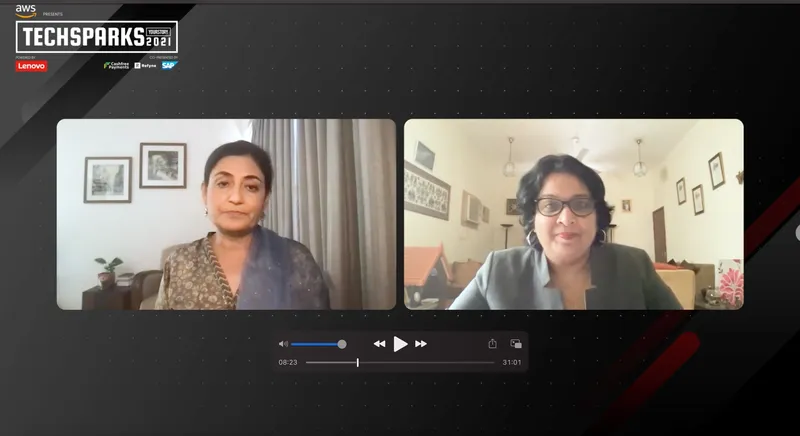You have the choice to react, act, and take control of what you want from your life and career, says Apurva Purohit
In a fireside chat on the sidelines of TechSparks 2021, Apurva Purohit, seasoned businesswoman and Co-founder of Aazol, spoke about why it’s essential for women to make their own choices, the need for organisations to have an equal opportunity mindset, and more.
“Lady, You’re Not a Man, You’re the Boss” — a combination of titles of Apurva Purohit’s two hugely popular books (Lady You’re Not A Man and Lady You’re the Boss) set the tone for an exciting fireside chat at TechSparks 2021, India’s largest tech-startup conference.
A businesswoman with over three decades of experience in the corporate world, Apurva formed significant partnerships with private equity firms and promoters to build and scale a diverse set of businesses.

Apurva Purohit, Co-founder of Aazol in a fireside chat with Rekha Balakrishnan, Lead Editor-HerStory
In her last tenure at Jagran Prakashan Limited — a multimedia conglomerate — Apurva reinvented the group from a deep-rooted reliance on traditional print businesses to focus on new age emerging businesses.
Not averse to taking risks, at the age of 55, Apurva started . The FMCG company seamlessly connects agri-producers and micro-entrepreneurs making homegrown foods with urban consumers in domestic and international markets using technology to optimise value for each stakeholder.
In the fireside chat with HerStory Lead Editor Rekha Balakrishnan, Apurva Purohit speaks about gender equality, making the right choices, and why we need men as allies.
Are women slaying it, or is it getting harder?
Apurva believes, when it comes to gender equality, the more things change, the more they remain the same.
“At one end, I am certainly seeing a change among the millennials, where both boys and girls are seeking equality. Men are supporting women to push for equality, and they are looking at non-genderised roles for themselves. So, the new man is equally a hunter and a nurturer,” she says.
On the other hand, she adds, it’s heartening to see younger girls pushing the envelope, wanting to have a career and a life and be successful at both.
“So, if you look around, changes in the larger ecosystem are happening at a slow space. According to the World Economic Forum, it will take nearly 200 years for gender equality. Societal change is happening, but at a languid pace,” Apurva says.
Amidst the COVID-19 pandemic, women’s roles extended beyond virtual workspaces, taking on multi-tasking to various levels. While she spoke about the need for every woman to have an action plan, does it work in unforeseen circumstances like the one we face?
Apurva outlines she is more in favour of having goals than action plans.
“The moment you have a very structured action plan, anything that happens out of the normal impacts you negatively. If you have a broad set of goals in the next 30 years of your career, you know where you want to go in the next five years,” she says.
She points out agility and adaptability are essential in the larger scheme of things, which gives us purpose.
“Happiness is defined by the little things we do and having a long-term purpose. However, you should be open to changing your action plan to achieve that set of goals,” she adds.
Making the right choices
In the Harry Potter series, Professor Dumbledore famously said, “It is our choices, Harry, that show what we indeed are, far more than our abilities.”
Apurva has consistently believed our choices define who we become more than the environment, the background, or our upbringing.
“My first lesson for myself, and which I keep telling young girls always to remember – is you have the choice to react, act, and take control and strengthen that muscle of choice. The second thing, at a meta-level, is the choice I made was it's going to be always family and career. It's not going to be either-or. Unfortunately, society keeps filling our minds that either you can have a successful family or a great career, you can't do both. And I think, somewhere we have started internalising it and believing that either I'll make a success of my marriage or my career,” Apurva explains.
The seasoned businesswoman outlines an underlying fact – she is not averse to taking risks and moving out of her comfort zone.
“At the age of 55, I decided to become an entrepreneur to make a meaningful social impact. My start is Aazol, a food startup that works with self-help groups to create a marketplace for them. It’s a risk that I am willing to take,” she says.
Where are the women at the top?
What holds women back from progressing in their careers, fuelling their ambitions, and reaching leadership positions?
Apurva says it’s all about the leaky pipeline.
She explains, “At the entry-level, in any organisation, you will find 30 to 40 percent women. And as they grow, along the leadership pipeline at the middle management level, this number falls to half. More importantly, at the senior management, the lowest level, it falls to one-third. When women reach middle management or vice president level, they look around and think, ‘I'm one of the few women left; this is the peak of my ambition’ and stop pushing themselves to reach the top for several reasons.”
These reasons include the lack of confidence of good mentors. Also, when it reaches the top, it becomes a lonely position and calls for certain decisions that are good for the organisation but may not be a popular choice. Women are used to or want to keep on playing nice.
How can it become a level playing field?
Indra Nooyi, in her recently released memoir, My Life in Full, wrote, “There are hundreds of issues why women don't lead big companies, but there's no single reason why women don't lead big companies because the workplace is still replete with damaging customs and behaviours that hold women back.”
What should organisations consciously track to make theirs an equal-opportunity one?
“I think organisations are paying attention to women-friendly policies for maternity, Flexi-timings, safety, and more. But they should also be mindful of what I call the paternalistic bias, which makes both men and women think that a woman is the weaker sex and needs to be taken care of – for example, let me not give her jobs that entail travel or softer roles,” she says.
“When you are giving the harder roles to men and the softer roles to women, as a consequence, you are grooming the men better. When the top job or the next promotion comes, you realise it's not a level playing field because the men have learnt more and the women have been protected,” she adds.
Men as allies, not adversaries
Apurva is happy the scenario is changing, and organisations and governments are pushing men to think of equality.
She says, “I am happy to see men delivering on this parameter and genuinely working with women. I would encourage men on this front to demonstrate equality at home. Are you picking up the nurturer role, an equal parent, or a caregiver? Even now, 70 percent of housework is taken up by women. This should change.”
To log in to our virtual events platform and experience TechSparks 2021 with thousands of other startup-tech enthusiasts from around the world, join here. Don't forget to tag #TechSparks2021 when you share your experience, learnings and favourite moments from TechSparks 2021.
For a line-up of all the action-packed sessions at YourStory's flagship startup-tech conference, check out TechSparks 2021 website.

Edited by Suman Singh








